Meat goats can be a great addition to your homestead! Learn about 7 popular meat goat breeds and find the best one for your homestead!
If you are searching for the perfect meat animal to raise on your homestead, consider goats! Many breeds have excellent feed-conversion rates and can be raised to butcher weight in just 6 months! While they do take more space than small meat animals like poultry and rabbits, they also deliver substantially more meat. And, they are still much smaller and may be more convenient to raise than larger animals like hogs and cattle since their size makes them easier to handle, transport and butcher.
Even though we use our goats for dairy purposes rather than meat, I still think goats are a great meat animal option for many homesteaders. Frankly, any goat of any breed could be used for meat, but there are certain breeds that are more ideal for meat production. These breeds are generally bulkier and more muscled than the dairy breeds that we raise on our homestead. As with any animal, you will want to give special consideration to genetics when selecting your animals, as this will greatly influence body composition and muscling.
Starting with goats does requires initial and ongoing investments in materials, supplies, feed and the animals themselves. Before buying any goats, weigh all your options and make sure that goats are a good fit for your homestead.
Before you get meat goats, consider the following:
- What purpose do you want your goats to serve?
Each breed of goats will have its own distinct characteristics, making it better for certain functions. In addition to meat, do you have other goals for your herd, such as milk production or weed management? Before buying, do some in-depth research to find the breed that will work best for your homestead. - What size of goats do you want?
Meat goats vary in size, from small (around 60 lbs) to large (around 250+ lbs). It’s important to take this into consideration, based on the size of space available for your goats. It is also important to think about what size of goat you feel comfortable handling. While you may not plan to handle your goats often, certain situations, like medical emergencies, may require you to handle and move the goats. Even small goats can be rather powerful when they feel like it! You will also want to have a method of transportation for your goats. While small goats can easily fit in a large dog kennel in the back of a car or SUV, you may need a trailer to haul larger goats. - How much land/feed do you have available?
Goats are foragers, meaning that they prefer leafy weeds, shrubby plants and trees rather than straight pasture grass. They are wonderfully adapted to sloped or rocky terrain that may be less ideal for other types of livestock. But they can also live in a pasture, or a dry area with supplemental feed like alfalfa or grass hay. A high-quality loose mineral intended for goats is also important to ensure they are healthy and receiving balanced nutrition. - How much interaction fo you want to have with your goats?
Certain goat breed will require more human assistance than other breeds. Some goats are perfectly fine to manage on their own with very little human interaction. However, other breeds may need more assistance, especially for kidding and raising their young. Some breeds also tend to naturally be more personable and trusting of humans than other breeds.
Seven Meat Goat Breeds to Consider for your Homestead:
Boer Goats:
Boer goats are probably the most popular breed of meat goat in the U.S. They have a fast rate of growth and tend to be hardy animals. They also tend to be docile and gentle, making them easy to raise and handle. Boer does are generally very good mothers to their kids and can raise them with limited human assistance. Many Boer goats will reach their market weight around 3-6 months of age, depending on the goat’s genetics and body composition.
Learn more about Boer goats by visiting the American Boer Goat Association!
Spanish Goats:
 Picture courtesy of Joe Mabel [GFDL (http://www.gnu.org/copyleft/fdl.html) or CC-BY-SA-3.0 (http://creativecommons.org/licenses/by-sa/3.0/)]
Picture courtesy of Joe Mabel [GFDL (http://www.gnu.org/copyleft/fdl.html) or CC-BY-SA-3.0 (http://creativecommons.org/licenses/by-sa/3.0/)]
Spanish goats are a heritage goat breed that was brought to the Caribbean and South America in the 1500’s. The Spanish goats of today are descendants of these goats, although they have been mixed with many other breeds over the years. These goats are extremely hardy and kid easily. They can even forage quite well in brush-like environments, earning them their nicknames, “scrub goats” and “brush goats”.
Learn more about Spanish goats by visiting the Spanish Goat Association and the Livestock Conservancy!
Nubian Goats:
Nubians are dual-purpose goats that are famous for their floppy ears, large size and playful personalities. They are a popular choice for homesteaders that want both milk and meat animals. Does (females) can be retained for milking after they kid and male kids can be raised for meat. Nubian goats have the highest milk butterfat percentage of all the full-sized dairy goats, making their milk creamy and rich! Nubian-Boer crosses are also becoming a popular option for homestead meat goats.
Learn more about Nubian goats by visiting the Anglo-Nubian Goat Association and the American Dairy Goat Association!
Kiko Goats:
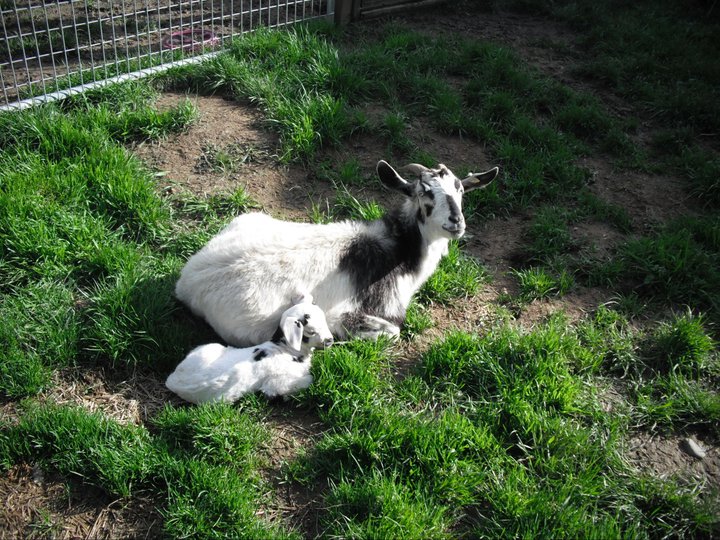 Picture courtesy of AslanEntropy [CC BY-SA 3.0 (https://creativecommons.org/licenses/by-sa/3.0)]
Picture courtesy of AslanEntropy [CC BY-SA 3.0 (https://creativecommons.org/licenses/by-sa/3.0)]
Kikos are relatively new to the U.S. Due to to their high feed conversion rates and their natural parasite resistance, they are quickly becoming popular with homesteaders and farmers in the Southern U.S., where parasite rates are higher due to the warm damp climate. They require very little human interaction and are very efficient at raising their kids and thriving in rough terrains with limited inputs. “Genemaster” goats, a cross between Boers and Kikos, are also becoming popular among meat goat farmers and homesteaders.
Learn more about Kiko goats by visiting the National Kiko Registry and the American Kiko Goat Association!
Myotonic/Tennessee Fainting Goats:
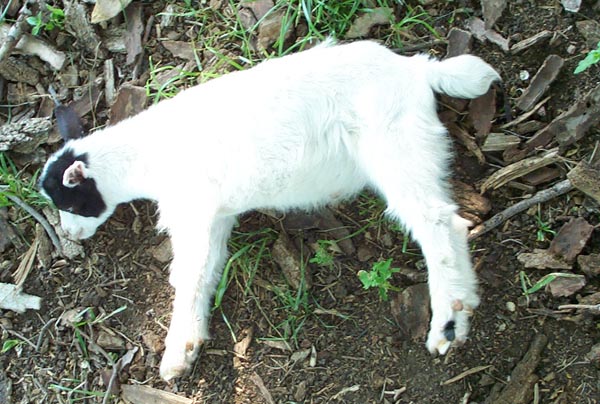
Myotonic goats are a landrace breed of goat, which means that they have been adapted over time to better suit their environment. Because of this, they vary in size, but tend to be small to medium-sized goats. They are best know for their genetic “fainting” condition, which causes their muscles to become rigid when they are surprised! They are quite dense and muscled, making them a good choice for meat goats. Myotonic goats are prolific breeders and are generally able to raise kids without human assistance.
Learn more about Myotonic goats by visiting the Livestock Conservancy!
Pygmy Goats:
Pygmy goats, which I raised throughout high school, are popular for pets because of their small size. But don’t let their size fool you! They are muscular and stalky (called “cobby”), with male bucks often topping out around 100 pounds! They are very social goats and tend to be hardy, although they do need occasional assistance with kidding. Due to their size, they could be a good meat goat breed for small-space homesteads.
Learn more about Pygmy goats by visiting the National Pygmy Goat Association!
Kinder Goats:
Kinder goats are a cross between a Pygmy goat and a Nubian. They are a dual-purpose breed that definitely deserves a mention as a homestead meat goat! Popular for their smaller size and their personalities, they have both milk production and meat production capabilities. Does (females) can be retained for milking while the males are used for meat purposes. While their milk production is lower than that of full-size dairy breeds, their milk is high in butterfat and delicious!
Learn more about Kinder goats by visiting the Kinder Goat Breeders Association!
What is your favorite meat goat breed? Share what it is and tell us why you love them in the comments below!

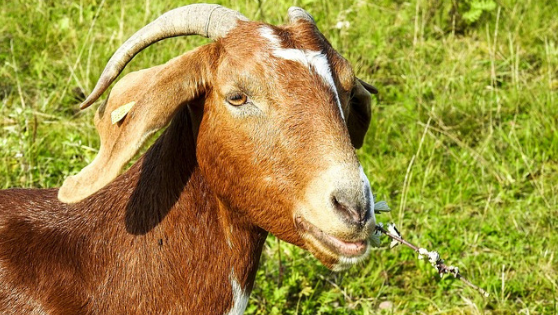

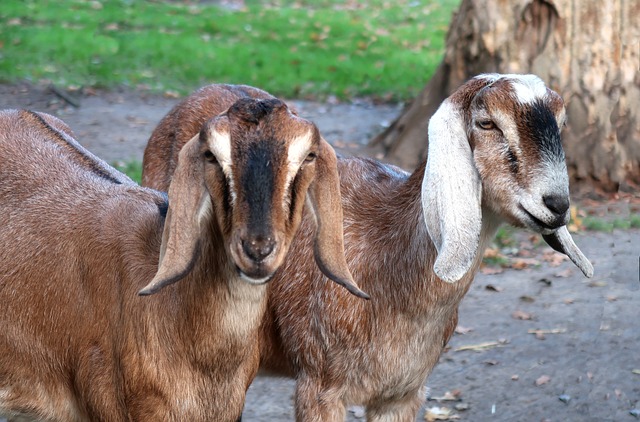


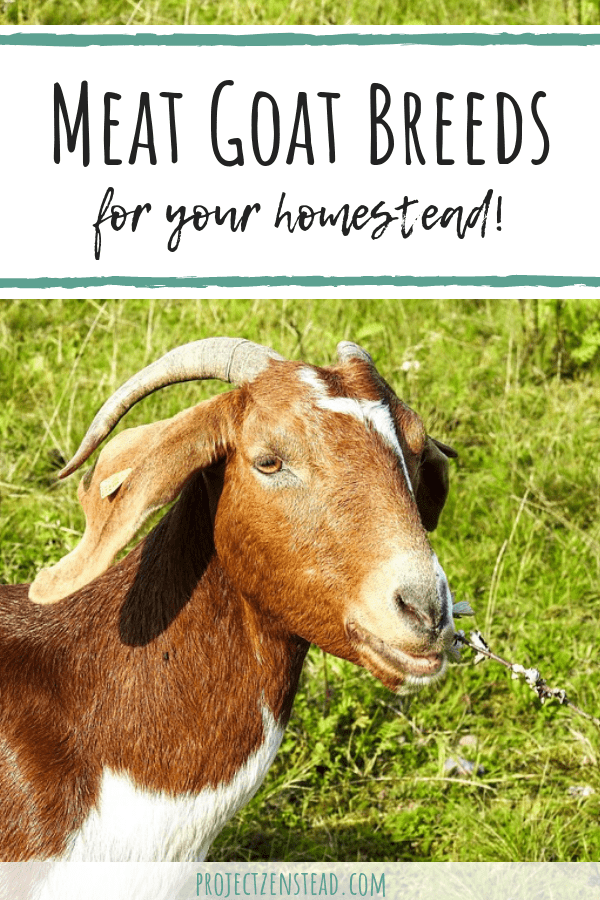
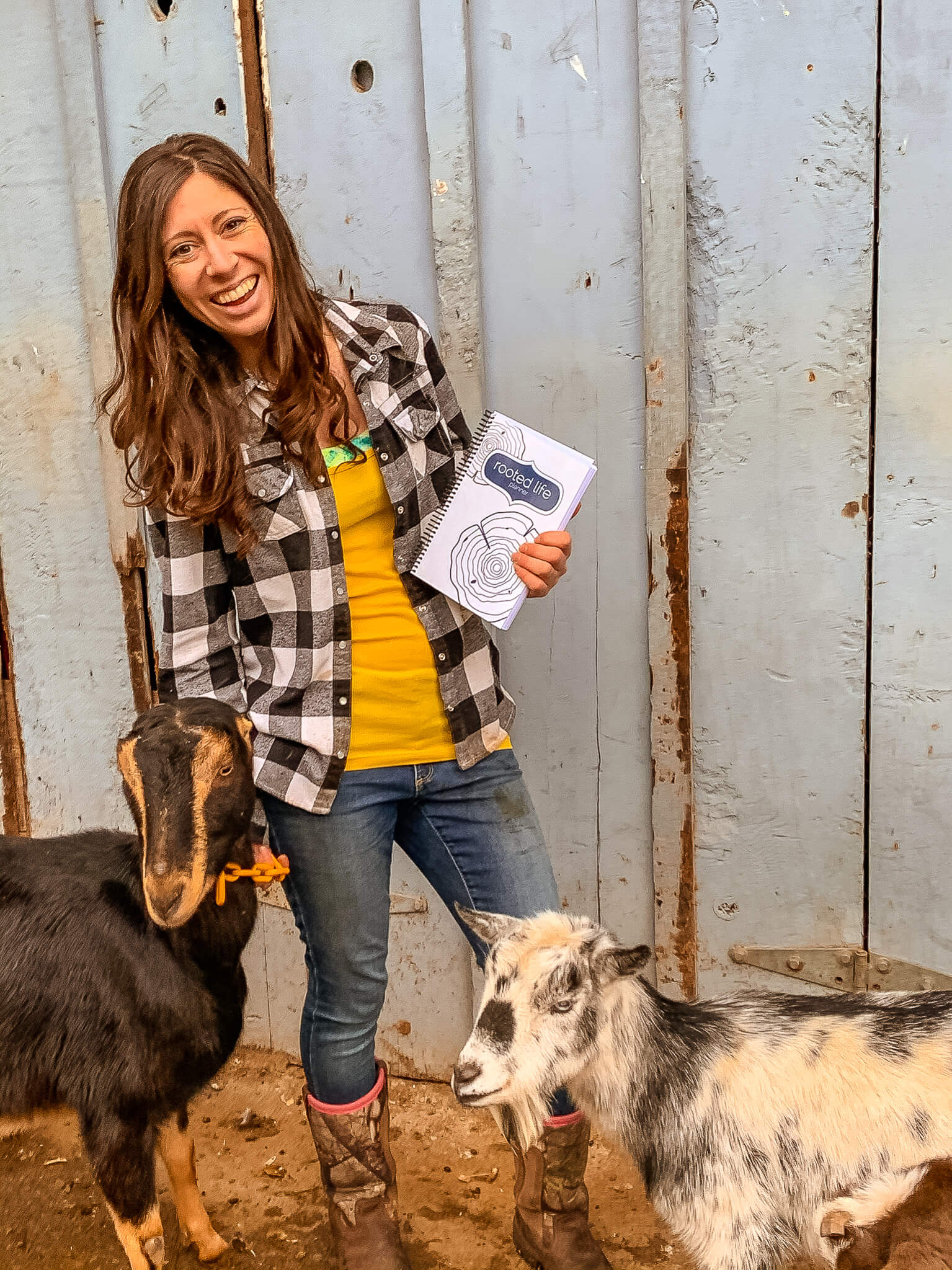
Ivan Kinsman
Tuesday 6th of July 2021
Hello,
I really liked this article and have reposted a link to it here:
https://rainwaterrunoff.com/milk-and-meat-goats-on-pasture/
I have also incorporated a video by Cedar Mesa Ranch in CO who breed meat goats.
Best,
Ivan
Project Zenstead
Tuesday 6th of July 2021
Thanks for sharing! I really like your site. It seems to have a ton of great resources!